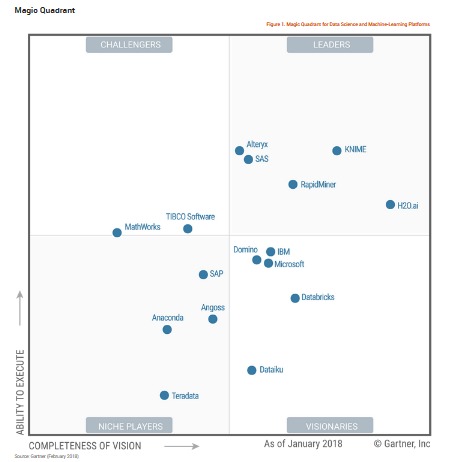
-
30 Aug
-
Magic Quadrant for Data Science and Machine-Learning Platforms - Part 1
Data science and machine-learning platforms enable organizations to take an end-to-end approach to building and deploying data science models. This Magic Quadrant evaluates 16 vendors to help you identify the right one for your organization's needs.
This Magic Quadrant evaluates vendors of data science and machine-learning platforms. These are software products that data scientists use to help them develop and deploy their own data science and machine-learning solutions. More precisely, Gartner defines a data science and machine-learning platform as:
A cohesive software application that offers a mixture of basic building blocks essential both for creating many kinds of data science solution and incorporating such solutions into business processes, surrounding infrastructure and products.
Machine learning is a popular subset of data science that warrants specific attention when evaluating these platforms.
Cohesiveness is an important attribute of a data science and machine-learning platform. The basic building blocks should be integrated into a single platform. The platform's components should have a consistent "look and feel" and be interoperable across the entire analytics "pipeline" — from accessing and analyzing data to operationalizing and managing content.
A data science and machine-learning platform supports data scientists in the performance of tasks across the entire data and analytics pipeline. These include tasks relating to data access and ingestion, data preparation, interactive exploration and visualization, feature engineering, advanced modeling, testing, training, deployment and performance engineering.
Building your own data science and machine-learning models internally is not the only option, however. For outsourcing options, see "Market Guide for Data Science and Machine-Learning Service Providers." In addition, some vendors offer analytic solutions focused on specific industries or types of analysis. This Magic Quadrant does not evaluate such vendors specifically, but it does assess whether the featured vendors offer prepackaged content to address specific needs.
This year's Magic Quadrant includes the term "machine learning" in its title (compare 2017's "Magic Quadrant for Data Science Platforms"). Although data science and machine learning are slightly different, they are usually considered together and often thought to be synonymous. "Machine learning" is the term most often used in vendors' marketing materials, and it frequently appears in research on this market. The Magic Quadrant's new name reflects machine learning's momentum and its significant contribution to the broader discipline of data science.Sourced by: https://www.gartner.com/doc/reprints?id=1-4RNH03T&ct=180222&st=sb&utm_content=buffer21830&utm_medium=social&utm_source=twitter.com&utm_campaign=buffer
- 30 Aug, 2018
- 168Solution Public Class
